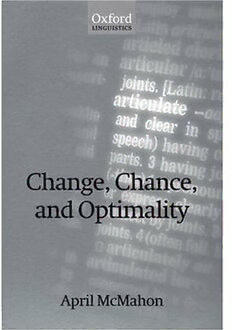Table Of ContentLINGUISTICS
Change, Ellanee,
and Optimality
April McMahon
Change, Chance, and Optimality
Change, Chance,
and Optitnality
APRIL McMAHON
OXFORD
UNIVERSITY PRESS
This book has been printed digitally and produced in a standard specification
in order to ensure its continuing availability
OXFORD
UNIVERSITY PRESS
Great Clarendon Street, Oxford OX2 6DP
Oxford University Press is a department of the University of Oxford.
It furthers the University's objective of excellence in research, scholarship,
and education by publishing worldwide in
Oxford New York
Auckland Cape Town Dares Salaam Hong Kong Karachi
Kuala Lumpur Madrid Melbourne Mexico City Nairobi
New Delhi Shanghai Taipei Toronto
With offices in
Argentina Austria Brazil Chile Czech Republic France Greece
Guatemala Hungary Italy Japan South Korea Poland Portugal
Singapore Switzerland Thailand Turkey Ukraine Vietnam
Oxford is a registered trade mark of Oxford University Press
in the UK and in certain other countries
Published in the United States
by Oxford University Press Inc., New York
Oxford is a registered trade mark of Oxford University Press
in the UK and in certain other countries
Published in the United States
by Oxford University Press Inc., New York
© April McMahon 2000
The moral rights of the author have been asserted
Database right Oxford University Press (maker)
Reprinted 2005
All rights reserved. No part of this publication may be reproduced,
stored in a retrieval system, or transmitted, in any form or by any means,
without the prior permission in writing of Oxford University Press,
or as expressly permitted by law, or under terms agreed with the appropriate
reprographics rights organization. Enquiries concerning reproduction
outside the scope of the above should be sent to the Rights Department,
Oxford University Press, at the address above
You must not circulate this book in any other binding or cover
And you must impose this same condition on any acquirer
ISBN 0-I 9-824 I 25-9
For Flora, who arrived in Chapter 3
Preface
Optimality Theory, which has developed and spread at speed
through 1990s linguistics, is a good illustration of the fact that
new theories are exciting, if not intoxicating. So many analyses of
so many phonological phenomena have been presented in con
straint-based terms that sheer volume is almost becoming an
argument for OT in itself. To accept the theory, however, we really
need to confront its basis as well as its results, and this require
ment has shaped my own evaluation in two ways. First, I do not
attempt to be comprehensive in my consideration of OT analyses:
there is such a flood of these (and so many are available only elec
tronically, where they may not be subject to the usual require
ments of peer review; although it is pleasing to see more OT
papers appearing now in more conventional journals), that the
task would be never-ending, and runs the risk of becoming
bogged down in detail. Secondly, my own interests in historical
linguistics and evolutionary theory lead me to consider OT from
the perspectives of sound change and the evolution of language,
on the grounds that confronting theories with different types of
data, and examining them from sometimes unexpected angles,
can help us understand what they can do, and just as importantly,
what they cannot and should not do.
I would like to thank the Humanities Research Board of the
British Academy, as it then was, for the award of a period of
research leave, during which I was able to start contemplating this
project. I am grateful to audiences for comments and feedback on
papers exploring some of the themes developed here, presented at
the Second International Conference on the Evolution of
Language in London; Current Trends in Phonology II in Paris; the
tenth International Conference on English Historical Linguistics
in Manchester; meetings of the Linguistics Association of Great
Britain in Luton and Manchester; and at the Universities of
vm Preface
Cambridge, Oxford, Edinburgh and Durham: special thanks here
go to Ricardo Bermudez-Otero, Roger Lass, and Peter Matthews.
Three readers for OUP supplied thoughtful and interesting com
ments, and improved the book very considerably, and John
Davey, my editor at OUP, has been unfailingly helpful and sup
portive. Most of all, I thank my family: Rob, who continues to
make it all possible, only in part by acting as translator and inter
preter extraordinaire of the literature on genetics and evolution;
and Aidan and Fergus, whose current daily struggles up the
foothills of English remind me constantly how vital language is,
and how important it is that we understand it.
AMSM
Cambridge, January 2000
Contents
1 Optimality Theory: the Basics 1
1.1 Past 1
1.2 Present 5
1.3 Future? 9
2 Optimality in a Complex World: Additions
and Extensions 13
2.1 The whole story? 13
2.2 Inviolable constraints and principles of
constraint interaction 14
2.3 System-specific strategies 19
2.3.1 Language-specific constraints 19
2.3.2 The reintroduction of rules 24
2.4 Correspondence Theory 33
2.5 Morphology-phonology interactions 41
2.6 Sympathy 47
2.7 Optimality and acquisition 52
3 Constraints, Causation, and Change 57
3.1 History matters 57
3.2 The Cutting Edge: between synchrony and
diachrony 58
3.2.1 Epenthesis and deletion 58
3.2.2 Metathesis 75
3.2.3 Chain shifts 85
3.3 Constraint reranking and the explanation of change 90
3.3.1 Modelling sound change in OT 90
3.3.2 The Great Vowel Shift: Miglio (1998) 92
3.3.3 Historical segment loss 98
3.4 OT and variation 105

